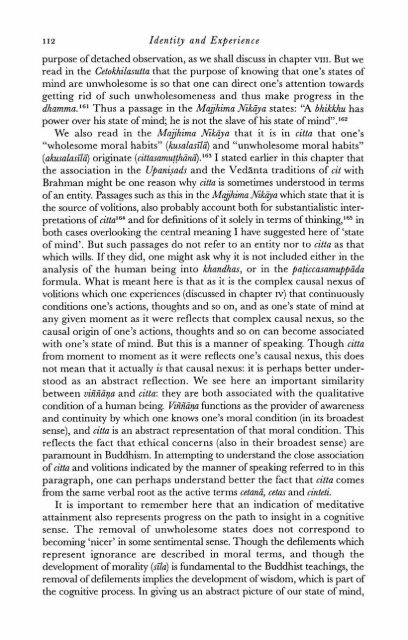Identity and Experience_Hamilton_1996
Identity and Experience_Hamilton_1996
Identity and Experience_Hamilton_1996
You also want an ePaper? Increase the reach of your titles
YUMPU automatically turns print PDFs into web optimized ePapers that Google loves.
I 12<br />
<strong>Identity</strong> <strong>and</strong> <strong>Experience</strong><br />
purpose of detached observation, as we shall discuss in chapter VIII. But we<br />
read in the Cetokhilasutta that the purpose of knowing that one's states of<br />
mind are unwholesome is so that one can direct one's attention towards<br />
getting rid of such unwholesomeness <strong>and</strong> thus make progress in the<br />
dhamma.161 Thus a passage in the Majhima Nikqa states: "A bhikkhu has<br />
power over his state of mind; he is not the slave of his state of mind".16*<br />
We also read in the Majjizima Nikiiya that it is in citta that one's<br />
"wholesome moral habits" (kusalasilii) <strong>and</strong> "unwholesome moral habits"<br />
(akusalas2'lZ) originate (citta~arnu?thiinZ).'~~ I stated earlier in this chapter that<br />
the association in the Upani:ads <strong>and</strong> the Vedanta traditions of cit with<br />
Brahman might be one reason why citta is sometimes understood in terms<br />
of an entity. Passages such as this in the Majhima Nikea which state that it is<br />
the source of volitions, also probably account both for substantialistic interpretations<br />
of ~ittal~~ <strong>and</strong> for definitions of it solely in terms of thinking,165 in<br />
both cases overlooking the central meaning I have suggested here of 'state<br />
of mind'. But such passages do not refer to an entity nor to citta as that<br />
which wills. If they did, one might ask why it is not included either in the<br />
analysis of the human being into kh<strong>and</strong>has, or in the pa6casamuppZda<br />
formula. What is meant here is that as it is the complex causal nexus of<br />
volitions which one experiences (discussed in chapter rv) that continuously<br />
conditions one's actions, thoughts <strong>and</strong> so on, <strong>and</strong> as one's state of mind at<br />
any given moment as it were reflects that complex causal nexus, so the<br />
causal origin of one's actions, thoughts <strong>and</strong> so on can become associated<br />
with one's state of mind. But this is a manner of speaking. Though citta<br />
from moment to moment as it were reflects one's causal nexus, this does<br />
not mean that it actually is that causal nexus: it is perhaps better understood<br />
as an abstract reflection. We see here an important similarity<br />
between vifiiiiina <strong>and</strong> citta: they are both associated with the qualitative<br />
condition of a human being. Viiifiap functions as the provider of awareness<br />
<strong>and</strong> continuity by which one knows one's moral condition (in its broadest<br />
sense), <strong>and</strong> citta is an abstract representation of that moral condition. This<br />
reflects the fact that ethical concerns (also in their broadest sense) are<br />
paramount in Buddhism. In attempting to underst<strong>and</strong> the close association<br />
of citta <strong>and</strong> volitions indicated by the manner of speaking referred to in this<br />
paragraph, one can perhaps underst<strong>and</strong> better the fact that citta comes<br />
from the same verbal root as the active terms cetanZ, cetas <strong>and</strong> cinteti.<br />
It is important to remember here that an indication of meditative<br />
attainment also represents progress on the path to insight in a cognitive<br />
sense. The removal of unwholesome states does not correspond to<br />
becoming 'nicer' in some sentimental sense. Though the defilements which<br />
represent ignorance are described in moral terms, <strong>and</strong> though the<br />
development of morality (sila) is fundamental to the Buddhist teachings, the<br />
removal of defilements implies the development of wisdom, which is part of<br />
the cognitive process. In giving us an abstract picture of our state of mind,


